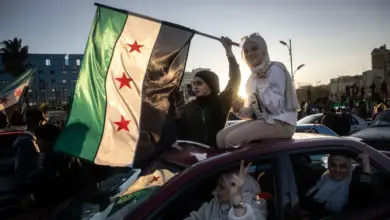Tahani al-Gebali, Egypt’s first female judge and vice president of the Supreme Constitutional Court, has recently taken the role of one of the most outspoken critics of the proposed constitutional amendments. As the countdown for the referendum on the changes continues, al-Gebali insists voters should cast a “no” ballot. Al-Masry Al-Youm sat with the 60-year-old judge to understand her vehement disapproval of the referendum slated for 19 March and to discuss the future of women’s rights in post-revolution Egypt.
Al-Masry Al-Youm: In your opinion, what should people do on March 19? Should they boycott the referendum or cast a “no” vote?
Tahani al-Gebali: They should go and say “no.” I am personally going to say “no” because we were not even given the chance to comment on the amendments. These modifications were presented as if they were a sacred book that should not be discussed. However, drafting a constitutional text is a political process in the first place. It should not be handled exclusively by a group of technocrats or legal experts. This process should be preceded by a large national dialogue in order to reach a national consensus over the matter. The constitution is a social contract that should be based on an agreement between different political and social segments.
The first decision made by the [army-appointed] commission was to hold its deliberations in secrecy. Hence, it deprived itself from listening to different viewpoints. We tolerated that and preferred to wait until the amendments came out. Then, we found ourselves in a bizarre situation. We were told these are the final amendments that people would vote on. This is not acceptable. The amendments should not be passed. I believe that the serious flaws of the amendments can lead to a lot of constitutional stalemates in the future. I am afraid that we will get out of one deadlock and then get into another. These amendments bear a serious threat and can lead to more chaos and more turbulence.
Al-Masry: What are the repercussions of voting in favor of the amendments?
Al-Gebali: If we say “yes”, we will reactivate the suspended constitution. This means that the the Supreme Council of Armed Forces cannot make any decision that has to do with running the country because the old constitution does not give the council the right to play such a role. Hence, if the council calls for presidential or parliamentary elections, the call will be marred by unconstitutionality.
Al-Masry: So if we reactivate the constitution, the army will have no right to call for elections?
Al-Gebali: Of course. If we reactivate the constitution, the army will have to go right away back to the barracks. To get out of this stalemate, we need to have a temporary constitutional declaration that addresses all different missions that should be assumed during the transitional period… If the military feels overloaded, especially if our borders are under threat, there are alternative means we can resort to. This temporary constitutional declaration can stipulate the formation of a presidential council. This council can consist of civilians as well as military representatives who would be in charge of running the country during the transitional period under the supervision of the armed forces.
Al-Masry: What will happen if people go and vote “no”?
Al-Gebali: At least decision makers will have to think then of other alternatives…the alternatives that we have just talked about might be conceivable.
Al-Masry: Why do you think the amendments went this way?
Al-Gebali: I do not know, but it is a reality now. I wrote a memorandum with all my remarks on the amendments to clear my conscience. I gave that document to constitutional jurist, [Deputy Prime Minister] Dr. Yehia al-Gamal and asked him to raise the matter with the Supreme Council of Armed forces and to make sure the referendum is postponed until the door is open for a national dialogue.
I spoke on several occasions and said the Supreme Constitutional Court should be consulted on the matter. This court is the highest constitutional reference point, yet, it has not been consulted over these amendments… The court itself was not invited to play any role in order to clarify the constitutional situation we are in or to help take the soundest constitutional steps.
It seems that there is a desire for things to go this way. We spoke in the media and on all occasions and sent messages to people within the establishment hoping that a dialogue would be held and the proposed scenario could be fixed and eventually, we could rebuild state institutions including the presidency and the parliament according to a precise and well-calculated constitutional pathway. To ensure stability and to build unshakable institutions, we have to make sure all steps are constitutional. Can we afford electing a parliament and then having to deal with appeals challenging its constitutionality later on?
In the meantime, there are calls to draft a new constitution. What if the new constitution cancels the Shura Council later on? We will have to get rid of it then. So we will be canceling the council after candidates had spent millions and killed themselves to garner seats.
Al-Masry: What is the scenario that you are proposing for the transitional period?
Al-Gebali: I am for electing a president after six months according to a temporary constitutional declaration. In this declaration, we can make it compulsory for the new president to call for a national association elected by the people to draft a new constitution within another six months.
The article that was added [by the army-appointed commission] gives the parliament the right to elect the association that will be in charge of drafting this new constitution. What if the upcoming parliament is dominated by a limited number of forces and fails to accommodate other existing segments? And this might happen. When we asked the commission how the parliament is going to elect this 100-member association, we did not get a clear answer. Would the association members be elected from the parliament itself or from outside the parliament? The answer was not clear, however, constitutional articles have to be very precise.
Actually, if that association consists of parliamentarians, this will be catastrophic, especially if different forces are not represented in the parliament. And if the commission is elected from outside the parliament, we will be reversing the rule. In this case the parliament will be choosing from the people. However, the rule is to let the people choose and not the opposite…This is a huge risk. That article stands as the most dangerous amendment because it took people’s right to decide on how the constitution should be drafted and gave it to the parliament. The constitution should be drafted by people’s direct will.
We hope that the Egyptian people will not have to hold a revolution every day to change their realities. We want a modern civil state that is constitutionally sound. The situation is difficult and we have to study each and every step and make sure that the people’s will is not circumvented.
Al-Masry: How would you assess the status of women’s rights during Mubarak’s 30-year rule?
Al-Gebali: It is beyond doubt that Egyptian women struggled over the course of history to gain their rights. This struggle began in the 1920s. A lot was achieved especially after the 1952 revolution. That revolution changed social and economic realities. Eventually, the idea of co-education gained momentum and families developed ambitions to send their daughters to school and the job market. Then, in 1956, women acquired political rights.
Over the last 30 years, women’s rights were codified in laws and in the constitution, but were not enjoined in reality. This was the main challenge facing women during the last 30 years.
Since the early 1970s, there has been a wave of cultural regression and eventually many of women’s rights were shaken. Public opinion changed. People began to believe that women should not engage in politics and should not work and should dedicate their efforts to their families. Religious intransigence contributed to those ideas; religion was used to question women’s right to work and claim that their engagement in the job market contradicts with their main role as a mothers. Also, economic problems and job scarcity contributed to keeping women away from the job market. The society preferred that men should have priority for limited job opportunities. This cultural environment posed many challenges to women’s right as full citizens. Additionally, women were denied rights that they were still struggling to acquire; For example, their right to hold certain positions like judges was challenged. Women’s abilities to hold senior positions and to be part of sovereign state institutions were questioned. The main challenge that women faced over the last 30 years was how to activate rights that are legally codified in reality.
Al-Masry: Earlier this week, women held a march to celebrate International Women’s Day but they were mocked and harassed. What is your assessment of that?
Al-Gebali: Some political and regressive forces want to shake women’s rights that have already been achieved. These forces are hostile to women’s rights by definition. They felt threatened when they got wind of efforts to celebrate that day. This symbolic celebration was eventually besieged in order to prevent women from bringing their rights into the limelight at this revolutionary juncture. There are forces that want to cause a setback in this realm. Hence, we start hearing arguments such as: “Is this time for such demands? Do you want to cause more divisions?”
Any group has the right to speak out loud about its own rights and make sure there is a national consensus over these rights. And it is not only women who are doing that–I saw protests by disabled people. The same is happening with religious minorities. Their rights came to the fore again in the wake of the recent sedition that is being imposed on us. Also, employees and workers are raising particular demands. Nobody can oppress voices that claim their rights. Each group should be allowed to express its grievances. This is part of democracy. Whoever refuses to listen to someone else, for the simple reason that he holds a different viewpoint, is violating democratic principles.
Al-Masry: Some people say it is inappropriate for each group to hold marches or protests to promote its own demands at this critical moment. Some people are accusing these groups of thwarting the revolution.
Al-Gebali: I do not agree with this opinion. These groups were part of the revolution and now as we are about to draw a map for Egypt’s future, they are grabbing people’s attention to their rights and issues. What is wrong with that? Also, there are rights that have to be instated immediately, including the right for a minimum wage. There is a final court verdict regarding this and the verdict is binding and must be respected. Why is the enforcement of this verdict being delayed? In the meantime, a wage ceiling should be enforced. Such a ceiling will leave us with a surplus of cash that we can use to finance minimum wages. In this case, nobody can claim that we are overloading the budget. If we make both decisions concurrently, things will be balanced.
Al-Masry: How could women benefit from this new revolutionary juncture?
Al-Gebali: I believe women should benefit from the revolutionary mode by stressing the rights that they have already gained and make sure there is no setback in this realm. Most of women’s rights are achieved legally and constitutionally. Yet, we should thwart attempts that aim at hindering the activation of these rights on the ground.




